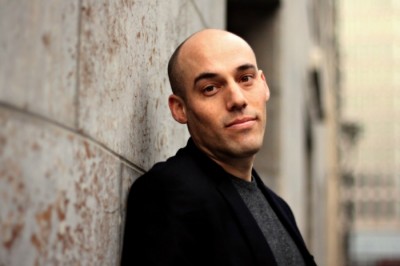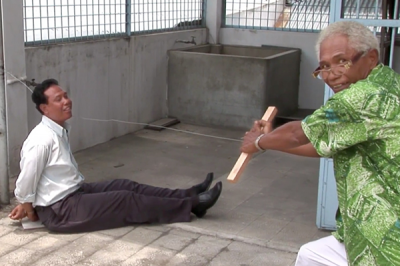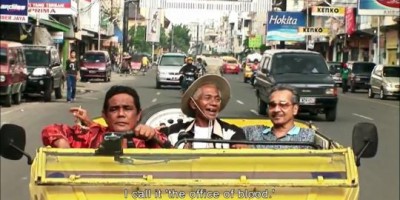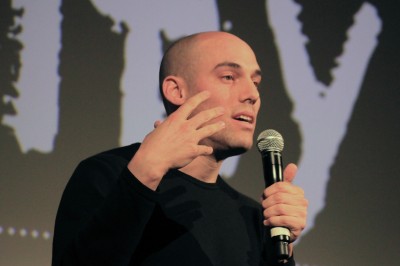The Act of Killing starts with a quote from Voltaire “It is forbidden to kill. Therefore, all murderers are punished, unless they kill in large numbers, and to the sound of trumpets.” This sums up a movie that takes your into the mind of mass murderers. If you ever wanted to know what makes them tick but were afraid to ask, this movie may be for you.
The movie tells the story of the 1965 military coup in Indonesia through the eyes of the paramilitaries and gangsters who were tasked with putting down the any rebellion or dissenting thoughts in the country. The movie/documentary spends time with various leaders as they proudly recount stories.
Filmmaker Joshua Oppenheimer got involved in the project after various human rights groups asked him to film the perpetrators of the atrocities. “This film is really about impunity and how winners of conflicts get to build their own reality and history.” I hope that “People look deeper than seeing this as a film about the evil that these men did, but see how society is ‘partly to blame for enabling them.”
Herman Koto is one such man, the movie starts with him in a village trying to recruit actors to play communists to help him recreate his acts of depravity and apparently shows no remorse. Another, Anwar Congo says he forgets by doing drugs, listening to music and dancing. They say one of the reasons they are telling their story is because it is history.
Oppenheimer clearly falls in “love” with Anwar. “Anwar’s pain was closer to the surface and it seemed like he was going to be interesting. He looked very disturbed after seeing the scene on the roof of him dancing in a place where he killed hundreds of people. It became a long process of shooting scenes and then getting his reaction from him. His journey emerged out of the process.”
Leaders in Indonesia see Gangsters as free men who are able to do whatever they want, the exact opposite of the communism that they despise. Gangsters were and are their heroes and had no problems directing them to do their dirty work.
One of the scariest men was a local newspaper owner, Ibrahim Sinik interrogated “communists” in his office and even if they didn’t give him the answers that he wanted, he’d change them so that he could kill them. He says his job was to make the public hate communists. The guy was proud of everything he did. When Herman comes into his office, both guys joke about how they are stars now.
“I agree with you the boss of the Press was the scariest guy. He said that he was an artist and humanist and he could never kill anything. The fact that you can be one step removed from the slaughter and still sleep at night with a clean conscience is chilling and he was the head of a human rights group.”
The movie also spends time with Pancasila Youth leader Yapto Soerjosoemarno who says he killed them all, when asked what they did with Communist. He believes that too much democracy is a bad thing and that if the Pancasila Youth are gangsters then he is the biggest one of all.
“Every perpetrator I filmed knows what they did was wrong and by boasting about it they know. There’s a sense that they are an exception to the rule. Perpetrators of mass killings always win, and the United States even has a history of rewriting history. They never apologized for slavery or slaughtering all the Indians,” said Oppenheimer.
I’m not entirely the sure what the point of this movie is, as I get older, I get more and more jaded about films and it is hard to see how this film doesn’t glorify these men. One even says that he was influenced by movies when he was younger and more violent than the films he saw and calls himself a “movie theater gangster.” Yes it shines a spotlight on their actions, but without any kind of consequences for them, they get to become a weird kind of movie star in their countries. During one reenactment they even dress and act like their favorite film gangsters.
“If Anwar and his friends are categorized as monsters than we have to admit that we need them to keep our products and services are cheap. When we buy skin creamer we pay a dollar for it, but the real cost is unbelievably high in the cost of lives associated with us getting cheap products.”
Oppenheimer continues with his impassioned plea “I see this as systematic, it doesn’t mean we have to resign ourselves to it and accept it, but figure out how to change it. We deny ourselves the ability to understand, reconcile and prevent things like this from happening again.”
Adding, “The US sold Attack Helicopters to Indonesian against all the wishes of the GSO and human rights organizations. We need to examine our relationship with them from a government and corporate perspective. We need to own up to our crimes of the past and own up to our relationships with dictators.”
I always wonder how people balance their religious beliefs with their killing. It seems to me they would be mutually exclusive things, but when you are blinded by zealotry, I guess it is easy to convince yourself that whatever you do for the greater “good” will always be seen as the correct course of action.
One thing that’s great about films is its power to start uncomfortable discussions. “This film has triggered a sea change in how Indonesia has talked about the past and for the first time they have called it genocide. There’s a big call for the Government to apologize and the US has never apologize for the slaughter of the Indians. The US needs to declassify their CIA documents.”



